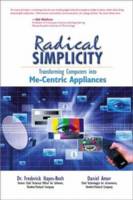Foreword by Ian Browde
One dark night a dervish passing by a dry well heard a cry for help. "What is the matter?" he called down.
"I am a grammarian, and have fallen due to my ignorance of the path, into this deep well, where I am all but immobilized," came the response.
"Hold friend I'll fetch a ladder and rope," said the dervish.
"One moment please!" said the grammarian, "Your grammar and diction are flawed; be good enough to amend them."
"If that is so much more important than the essentials," shouted the dervish "you had best stay where you are until I have learned to speak properly."
And he went on his way.
From Tales of the Dervishes, Idries Shah.
Our lives are growing more and more complicated. Technology aimed to relieve our burden is increasingly difficult to use and to manage. Experts and meta-experts are required even for the apparently most simple of tasks. We have become "slaves of what our slaves create."
There are few people that I encounter these days who are not too busy, too stressed, or too pressed for time. Companies of all hues, particularly the large "successful" ones, are feeling pressure on their ability to sustain the business models that brought them to where they are. Lay-offs are commonplace, health benefits are being cut or re-structured, and many employees privately view employment as a privilege not a right. All the time, executives, managers, especially IT managers, are driving harder to "do more with less." A fundamental shift is required, not only in what we do but in how we think.
Enter Radical Simplicity by Rick Hayes-Roth and Daniel Amor. These two technology visionaries share a perspective of why the reality we are experiencing is the way it is, and why that can change over the next decade or so. The reality this important book helps us see is that we are living in the era of computers as tools. Ironically, the better we are at using these tools, the greater the load and the stress until we are literally bursting our seams mentally, physically, and emotionally.
This forward-looking work helps us gain insight into the fact that the many tool users around the world are really the menial workers of the information age. Yet we continue to believe that another Powerpoint presentation, another MS Word memo, another Excel spreadsheet, not to mention the 20, 90, 250 emails a day of dubious value, are providing us a better life.
Hayes-Roth and Amor, in a simple, accessible way called me-centric computing, offer a view into a possible future that is ours for the taking. They share a vision of a new possibility for our relationship with these ubiquitous tools, and hence ourselves, that could be a Renaissance in how human beings work, learn, and play with computers as our support system, our agents, and our menial task performers.
This book is essential reading for any business or technology strategist who wants to ensure that her or his company will survive the next decade and be part of the emerging solution, part of the knowledge age or the age of enlivenment.
Radical Simplicity uses its own metaphor and simply tells us that most of the technology is presently available for this seemingly idyllic world where computers do the menial work and people get to take back their time and enliven their spirit.
Whether your interest is technologies and applications like SOAP, UDDI, HTTPS, and XML or whether you want a view of what is actually available like Cooltown, OnStar, Screenfridge, or Hive, it is all there.
If you want to understand how designing appliances and products must change and how to do it; or if you want to learn how software agents, mobility, and trust are fundamental building blocks for the future, this eminently readable book tells it like it is, simply and unpretentiously.
In a nutshell, Radical Simplicity urges us to move beyond focusing on the tools and the products and start focusing on each and every "me" out there; how we work, and what we need. The book tells us not just "why" but "how," while providing useful URLs as footnotes, a neat touch! It explains in both lay and professional terms how software agents are critical in our own evolution from tool-slaves to appliance-masters. It offers an optimistic yet balanced view of what the future can be, a most useful book; thanks Rick and Daniel.
Ian Browde
VP Business Development
Nokia Internet Communications
